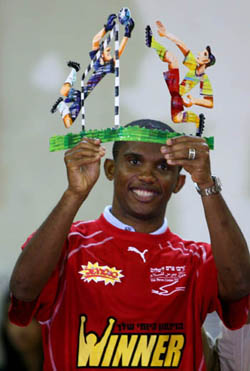U.S. midfielder DaMarcus Beasley has heard the ugly words, vicious taunts
screamed by fans in the Netherlands simply because he is black.
Cameroon's brilliant Samuel Eto'o was so sickened by insults hurled his way
that he threatened to walk off the field.

Eto'o of Cameroon
waves with a present in Ramat
Gan.[filephoto]
|
Even Thierry Henry, one of
the world's best players and a spokesman for racial tolerance, has been stung by
a slur - from Spain's coach, no less.
Soccer has struggled for years to rid itself of racism. For this World Cup in
Germany, which opens on Friday with two matches, the governing body of the
world's sport is making harmony a central theme.
"Football, like most sports, is combative _ you play to win. But it shouldn't
have anything to do with racism or violence," said Federico Addiechi, head of a
FIFA division which deals with corporate social responsibility. "The problem
will not disappear in a couple of days in the World Cup, but it's important to
highlight the problem when you have such a platform."
German officials who don't want racist thugs to seize that platform have
planned extensive security measures following recent attacks on minorities here.
FIFA is trying to do its part, making its message of tolerance a theme at
matches and highlighting its commitment at a news conference prior to kickoff.
Earlier this year, FIFA president Sepp Blatter could barely hide his
disappointment when he said: "It is a shame for football that in the year 2006,
you still have racism."
The 32-nation competition attracts fans from all over the globe. Even
researchers at the South Pole play an occasional game.
The game has the power to unite, as two first-time World Cup participants
show.
Angola's team, the Black Antelopes, helped bring together warring sides
during a brutal 27-year civil war. Ivory Coast's trip to Germany helped restart
peace talks between rebels and the government.
That kind of harmony doesn't always extend to fans, whose passionate
enthusiasm too often can be tinged with racial hatred.
Hooligans, who don't care who they beat up, get much of the attention, with
violence marring both the 1998 World Cup and 2000 European Championship. But as
more black and mixed-race players appear in far-flung European leagues, racism
is becoming even more pervasive.
In the last year:
Eto'o, who stars for Spanish power FC Barcelona, could be seen mouthing "no
more" after being taunted in February with monkey sounds for a second year by
Zaragoza fans. The team was fined US$10,700 (euro8,400), but that didn't stop
Santander fans from insulting Eto'o two months later.
Ivory Coast and Messina defender Marc Zoro was reduced to tears by racist
slurs and boos last November from Inter Milan fans.
Criticizing an influx of foreign players in Ukraine, national coach Oleg
Blokhin said youngsters should learn from native sons, "not some zumba-bumba
whom they took off a tree, gave him two bananas and now he plays in the
Ukrainian League."
Ghana hired a Serbian coach, Ratomir Dujkovic, who was later quoted as saying
that "discipline is the biggest problem with black Africans." Ghana officials
refused to fire him, saying they believed he had been "misrepresented" in the
interview.
Ujpest FC, a top Hungarian team, was fined US$23,250 (euro18,300) by the
country's federation in December after its fans chanted anti-Semitic slurs
during a league match.
AS Roma played its February 8 home game at a neutral site and without
spectators as punishment for its fans displaying Nazi and fascist symbols in a
match against Livorno.